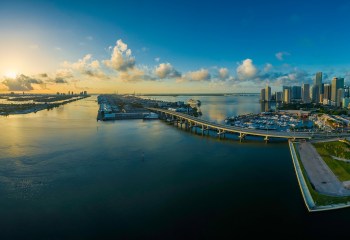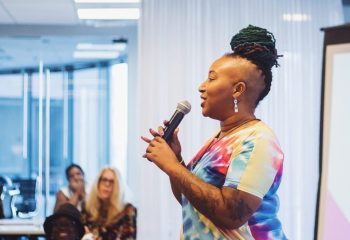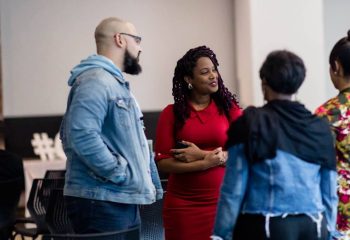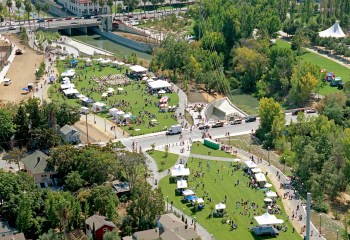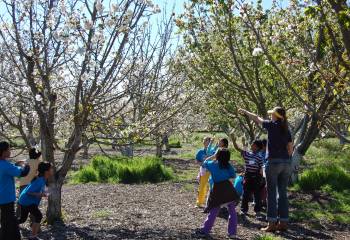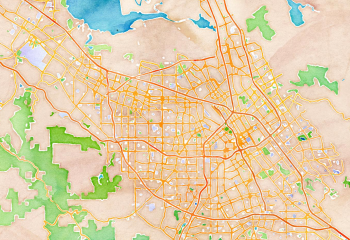For LISC Philadelphia to develop and implement a neighborhood plan, called “Southwest by Southwest,” and increase local community-based organization capacity so that Southwest Philadelphia residents can organize and advance their interests in current and planned development opportunities.
Program Area: Community Impact
Support staffing to expand the African American Community Service Agency (AACSA) Leadership Academy program in San Jose to drive visibility and collaboration between corporate leaders and the community.
To help Miami residents, community organizations, businesses and government reimagine the use of city streets that have been partially or fully closed as a result of the COVID-19 pandemic.
To support The Plug, a digital media company covering the Black tech economy, to track racial and gender representation in emerging innovation ecosystems.
To support the launch of the Center for Black Innovation, a comprehensive resource hub for Black tech entrepreneurs and innovators.
To support the launch of Black Girl Ventures’ Miami chapter.
To ground the insights from the “Miami’s Startup Ecosystem” report and to discuss next steps, we hosted a conversation with community leaders, “The Miami Opportunity: Expanding Access and Advancing Equity” (above).
When we look back on 2020, we expect to see it as a turning point for our community. As such, we must use this time to take stock of our journey to date in order to inform our future. Miami’s transformation over the last decade goes well beyond the city’s skyline. At its core, it is a story about people—those who are choosing to build and create in the Magic City. From its vibrant cultural landscape to its burgeoning startup community, Miami is home to a wide array of creators with a unique perspective.
In 2019, Knight Foundation partnered with Startup Genome to take a closer look at Miami’s startup community. This report is based on data that was collected then. At the time, it confirmed Miami’s upward trajectory while showing us that much remains to be done to catapult Miami into the echelons of the world’s best startup ecosystems.
We share this report as 2020 has brought new opportunities and challenges. The COVID-19 pandemic accelerated conversations about the future of work, especially where people will choose to live should the professional opportunities available to them become less tied to specific geographies. With tremendous urgency, the reenergized dialogue about racial inequities in America calls on us to acknowledge and amend the reality that the tech and innovation sectors often do not look like our communities. Creating pathways for access and prosperity for all is essential if Miami’s startup community is to flourish.
The insights drawn from this assessment are as relevant as ever. As Miami continues building the talent, funding and culture that drives its innovation ecosystem, this report reminds us of all we have built thus far and offers a roadmap for our community’s next steps.
Key insights
- By placing entrepreneurs at the center and better supporting their ability to build community with other founders, investors and experts, Miami would improve the ecosystem’s sense of community and retention of entrepreneurs.
- In 2019, Greater Miami attracted a record amount of venture capital, with $2.4 billion flowing to the region.
- Increasing the amount of funding available to early-stage startups would have positive effects downstream, closing funding gaps at the Series A stage and beyond.
- Among global ecosystems, Miami ranks 7th for share of female founders at 19%.
- Growing the number of employees who receive equity compensation (e.g. stock options) could help with talent retention and give Miami the opportunity to grow more talent with startup growth experience.
- Globally connected ecosystems achieve greater reach, more fully realizing their potential. Diversifying Miami’s global footprint beyond Latin America and growing ties to top ecosystems would improve the flow of global knowledge coming to the region and increase overall scale up potential.
Image (top) by Alejandro Luengo on Unsplash.
To promote greater collaboration among Black and Latino venture capitalists, institutional investors and entrepreneurs by supporting the expansion of Culture Shifting Weekend to Miami.
Knight Foundation’s $700,000 investment will help Guadalupe River Park Conservancy develop the public space into San Jose’s civic greenway and the Bay Area’s premier urban riverfront
SAN JOSE, Ca. — June 12, 2020 — The Guadalupe River Park Conservancy (GRPC) today announced new support from the John S. and James L. Knight Foundation for its work to catalyze the revitalization of San Jose’s Guadalupe River Park and Gardens through community engagement, programming and concept design. The GRPC will work to establish the three-mile linear park, which has seen a surge of park users during the COVID-19 pandemic, as a premiere destination for people to gather in San Jose.
Knight Foundation will invest $700,000 in GRPC as part of its three-year initiative for the Guadalupe River Park, announced in January. The GRPC will help establish a long-term vision for the park, which will be supported by research, new partnerships and capacity-building projects. Knight’s new investment comes as research from Knight Foundation and Urban Institute shows that greater access to parks and public spaces connects people to their communities.
“In light of increased park usage due to COVID-19, it is a good reminder of the potential impact this park project improvement will have, particularly for the more than 100,000 residents and 90,000 workers who are within a 10-minute bike ride to the park,” said Jason Su, GRPC executive director. “We believe it is more necessary than ever to develop a long-term vision, roadmap and foundation to revitalize the Guadalupe River Park and enhance the quality of life of our communities.”
Knight’s investment in the area will advance the park as an important public space for equitable recreation, economic development and transportation, helping it serve as a place to connect residents and visitors to the city. As a civic greenway in the city, Guadalupe River Park can become a catalyst for health, economic and social equity by connecting people to opportunity and to each other.
“We have been vividly reminded that many people in our community don’t feel safe, welcomed, or even connected to San Jose. COVID-19 has exposed the challenges that many people face as they try to connect to opportunity,” said Chris Thompson, Knight Foundation San Jose program director. “Now, more than ever, we need places where San Joseans from all walks of life can gather freely, find opportunity, and build trust in each other. Our research shows the value of public spaces for recreation, as engines for economic development, and to build attachment to community. This is San Jose’s opportunity to make a fresh start in a place that physically and metaphorically connects us all together.”
The Guadalupe River Park runs along the Guadalupe River through downtown San Jose between highways 280 and 880. Located in the heart of this multicultural Silicon Valley city, the greenspace connects several neighborhoods and the SoFA District to tech companies, businesses and cultural amenities downtown. Despite its history, which dates back to San Jose’s founding, investment in the Guadalupe River area has been lacking in recent decades. With growing development interest west of downtown San Jose, more attention has been given to the Guadalupe River Park as the city’s civic greenway.
The GRPC will use Knight’s investment to begin developing a vision for the park. It will also leverage GRPC’s existing volunteer and education programs to expand park programming. In partnership with the City of San Jose and the San Francisco Bay Area Planning and Urban Research Association (SPUR), a Bay Area urban think tank, GRPC will also conduct research and partnership development, as part of its work to maximize nonprofit/city relationships around park management. This collaborative effort will also leverage San Jose’s participation in Reimagining the Civic Commons, a national initiative involving innovative civic leaders from 10 cities who are transforming civic assets to connect people of all backgrounds, cultivate trust and create more resilient communities.
“We have the opportunity to think about how we envision the Guadalupe River Park as a cultural and natural institution of our region,” said Nicolle Burnham, deputy director of San Jose’s Department of Parks, Recreation and Neighborhood Services. “What is also exciting is the convening of partners and community engagement that will support implementing this shared vision.”
Founded in 1996 as “Friends of Guadalupe River Park & Gardens,” GRPC is San Jose’s nonprofit partner leading the long-term redevelopment, activation and stewardship of the park, with the aim of building a vision, programming and governance model for the overall space. GRPC’s vision is to establish the River Park as the premier urban riverfront of the Bay Area.
“The Guadalupe River Park is an amazing asset and opportunity to our community that can connect neighborhoods, workers, and visitors within downtown San Jose” said San Jose Downtown Councilmember, Raul Peralez.
Since 2008, Knight has invested more than $31 million to build a more engaged San Jose, with a focus on public life. It has also made significant investments to benefit the community in the arts, journalism and on a national scale.
###
About the Guadalupe River Park Conservancy
The Guadalupe River Park Conservancy provides community leadership for the development and active use of the Guadalupe River Park & Gardens through education, advocacy and stewardship. The Conservancy is continually involved in completing the master plans for both the park and gardens, creating educational programs, promoting awareness, and developing membership and volunteer opportunities to increase public support and involvement.
About the John S. and James L. Knight Foundation
Knight Foundation is a national foundation with strong local roots. We invest in journalism, in the arts, and in the success of cities where brothers John S. and James L. Knight once published newspapers. Our goal is to foster informed and engaged communities, which we believe are essential for a healthy democracy. For more, visit kf.org
###
Media Contacts:
Roshni Neslage, Communications Officer, Knight Foundation, 305.908.2623, [email protected]
Jason Su, Executive Director, Guadalupe River Park Conservancy, 408.298.7657 (office), [email protected]
Photo (top) courtesy of the Guadalupe River Park Conservancy.
MIAMI — June 11, 2020 — The John S. and James. L. Knight Foundation announced today its support for three national organizations that are committed to expanding opportunities and creating more equitable access for Black and Latino entrepreneurs in Miami.
Knight is investing $750,000 in Black Girls Venture, Culture Shift Labs and The Plug because equitable and inclusive participation in Miami’s entrepreneurial community is essential for the region and, ultimately, for a healthy democracy. This core belief drives Knight’s Miami program.
Black Girl Ventures ($250,000) intends to increase access to financial and social capital for Black and Brown women entrepreneurs through coaching, crowdfunding and community by supporting the launch of Black Girl Ventures’ Miami chapter.
Culture Shift Labs ($250,000) intends to promote greater collaboration among Black and Latino venture capitalists, institutional investors and entrepreneurs by supporting the expansion of Culture Shifting Weekend to Miami.
The Plug ($250,000) intends to drive equity within growing innovation hubs by bringing transparency to tech companies’ racial diversity, gender representation and compensation practices through the development of the PLEXUS analytics platform.
“Each of these organizations has been leading the conversation around the country on how to support a truly inclusive startup and innovation economy,” said Raul Moas, Knight’s Miami program director. “We’re delighted that they see Miami as the next frontier in asking sometimes uncomfortable questions about who benefits from opportunity, and who doesn’t.”
Miami’s startup community has grown by leaps and bounds over the last several years. In 2019, Knight Foundation partnered with Startup Genome to take a closer look at Miami’s entrepreneurial community and offer a roadmap to reach the next level. The insights offered in Startup Genome’s assessment are especially relevant as Miami responds to the opportunities and challenges from 2020.
Knight is hosting a virtual conversation with leaders from Miami’s startup community at noon, ET on Wednesday, June 17 to discuss insights from the Startup Genome report and discuss where we go next.
“It’s going to take all of us to build a Miami where everyone can benefit from the promises innovation and entrepreneurship offer—expanded individual opportunity and economic inclusion,” Moas said.
###
About the John S. and James L. Knight Foundation
Knight Foundation is a national foundation with strong local roots. We invest in journalism, in the arts, and in the success of cities where brothers John S. and James L. Knight once published newspapers. Our goal is to foster informed and engaged communities, which we believe are essential for a healthy democracy.
Media Contacts:
Black Girl Ventures
Communications: Sophie Aziakou, [email protected]
Culture Shift Labs
Founder/CEO: Andrea Hoffman, [email protected]
The Plug
Founder/CEO: Sherrell Dorsey, [email protected]
Knight Foundation
Communications Officer: Raul Garcia, [email protected]
Image (top): From Black Girl Ventures Foundation.
Seven innovative projects will use public data to enhance civic engagement.
MIAMI — June 10, 2020 — In an effort to transform how publicly available data is used in communities to engage residents, the John S. and James. L. Knight Foundation today announced $1 million in funding for seven innovative projects across the country that put data to work in support of greater civic engagement.
For more than a decade, an unprecedented amount of big data has been made available to the general public by governments and private companies through efforts such as the U.S. Open Government Initiative or Uber’s Movement platform. But so far, these efforts have mostly been leveraged by individuals with the technical expertise to successfully mine the data. Knight’s funding aims to advance such important aforementioned projects to harness data to generate greater civic engagement, and create more informed and engaged communities.
“These projects meet residents where they are — on platforms they recognize, and in the cities they know — to show that we can engage residents with data and create more responsive communities,” said Lilian Coral, Knight’s director for national strategy and technology innovation. “Utilized well, open data could help local governments effectively tackle major community issues, such as the health effects of lead and pollution, or growing gentrification in communities.”
These seven innovative projects (kf.org/opendatawinners) will work to enhance civic engagement by developing new models of public trust around big data, while also exploring new ways to capture community sentiment. If successful, they will serve as a spark for civic dialogue and conversation and help residents be a part of developing solutions for community challenges. Citizen engagement with data can also foster greater government and institutional accountability, since data will become clearer, more accessible and applicable to their daily lives.
Each project will operate in one of the 26 communities where Knight invests. They include:
- Visual Data to Support Urban Planning (Charlotte): To develop an immersive platform that allows 3D visualization of neighborhoods and community data that engages community members in the development of the City of Charlotte’s Comprehensive Plan. The effort will focus on young people, who have been especially disengaged.
- Neighborhood-Led Permitting (Philadelphia): To expand a startup, resident-led effort that draws on the city’s existing open data platform to notify neighbors of permitted construction and to provide educational resources to help identify unsafe construction which has led to building collapse and lead exposure.
- SIM-PHL (Philadelphia): To support the Entrepreneurial Game Studio at Drexel University that will use available municipal data to develop a SimCity-type game that allows residents to explore the political, economic and sociological forces that shape an urban neighborhood in a playful and engaging format.
- Edit the City! (Philadelphia): To generate public-sourced open data recommendations for the South Street Headhouse District vision planning process. Residents will be enabled to provide input on alterations to the public realm and co-create the future of the street through creative remote and digital engagement. In the first phase, the project will support the business community and the reopening and recovery of South Street in the aftermath of COVID-19.
- Urban Periscope (San Jose): To use augmented reality to create data visualizations telling pedestrians and residents about the spaces they are traversing and encouraging participation in civic action. The project is led by Gensler, a design and architecture firm shaping the future of cities.
- Making Civic Data Accessible with Audio (Wichita): A collaboration between the audio company Sonify, the Wichita Community Foundation, Envision and local newsrooms to use data in audio as a way to enable data-driven storytelling that targets users who are blind or visually impaired. The overall goal is to learn how to communicate data with sound, with the potential for wider applications.
- SmartAirLA-Long Beach Alliance for Children with Asthma (Long Beach): To pilot a real-time Asthma Alert that identifies when and where Long Beach asthma patients are likely to experience an asthma attack from concentrated air pollution. With the Alert, the Long Beach Alliance for Children with Asthma will reach out to pediatric asthma patients and their families to improve asthma self-management. The Alert will also help asthma patients avoid infections during outbreaks such as COVID-19 where air pollution and asthma are high-risk factors.
The open data initiative is part of Knight’s Smart Cities program, which seeks to support stronger, more engaged communities by enabling the voice of the community to be reflected in the design and use of technology.
###
About the John S. and James L. Knight Foundation
Knight Foundation is a national foundation with strong local roots. We invest in journalism, in the arts, and in the success of cities where brothers John S. and James L. Knight once published newspapers. Our goal is to foster informed and engaged communities, which we believe are essential for a healthy democracy.
Media Contact:
Marla Oxenhandler, [email protected], 954-699-4400 or Julie Spechler, [email protected], 954-401-1425.
Image (top): Charlotte, North Carolina by Clay Banks on Unsplash.
